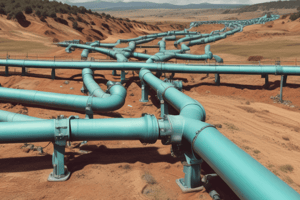Podcast
Questions and Answers
Какова основная выгода подземного хранения газа?
Какова основная выгода подземного хранения газа?
- Увеличение добычи газа
- Увеличение объема хранения газа
- Обеспечение стабильного и безопасного энергоснабжения (correct)
- Уменьшение стоимости газа
Как подземное хранение газа влияет на эмиссию парниковых газов?
Как подземное хранение газа влияет на эмиссию парниковых газов?
- Не влияет на эмиссию парниковых газов
- Уменьшает эмиссию метана в атмосферу (correct)
- Увеличивает эмиссию метана в атмосферу
- Заменяет метан другим парниковым газом
Что позволяет подземному хранению газа обеспечивать стабильность энергоснабжения?
Что позволяет подземному хранению газа обеспечивать стабильность энергоснабжения?
- Способность поставлять газ в периоды высокого спроса
- Способность хранить газ в периоды низкого спроса
- Все вышеперечисленное (correct)
- Увеличенный объем хранения газа
Какое из следующих заявлений является преимуществом подземного хранения газа?
Какое из следующих заявлений является преимуществом подземного хранения газа?
Какова роль подземного хранения газа в энергетической инфраструктуре?
Какова роль подземного хранения газа в энергетической инфраструктуре?
Какое из следующих преимуществ подземного хранения газа связано с обеспечением стабильности энергетического снабжения?
Какое из следующих преимуществ подземного хранения газа связано с обеспечением стабильности энергетического снабжения?
Какой аспект подземного хранения газа связан с уменьшением отрицательных экологических и социальных последствий?
Какой аспект подземного хранения газа связан с уменьшением отрицательных экологических и социальных последствий?
Какая из следующих характеристик подземного хранения газа делает его экономически эффективным?
Какая из следующих характеристик подземного хранения газа делает его экономически эффективным?
Какое из следующих преимуществ подземного хранения газа связано с уменьшением эмиссии парниковых газов?
Какое из следующих преимуществ подземного хранения газа связано с уменьшением эмиссии парниковых газов?
Какое из следующих преимуществ подземного хранения газа связано с уменьшением влияния изменчивости погодных условий на энергетическое снабжение?
Какое из следующих преимуществ подземного хранения газа связано с уменьшением влияния изменчивости погодных условий на энергетическое снабжение?
Flashcards are hidden until you start studying
Study Notes
Underground gas storage is an essential component of any energy infrastructure. This method involves storing natural gas in underground reservoirs, such as depleted gas fields, salt caverns, and aquifers. The primary advantage of underground gas storage is its ability to provide a buffer against gas supply fluctuations, ensuring a stable and secure energy supply during peak demand periods and unexpected disruptions in supply.
In this article, we will explore the key benefits of underground gas storage:
1. Balances Supply and Demand
Underground gas storage plays a crucial role in balancing the supply and demand of natural gas in the energy market. During periods of low demand, excess gas is stored underground, and when demand is high, the stored gas can be released into the grid, maintaining a consistent supply and helping prevent price spikes. This ability to store excess gas helps ensure energy security and stability.
2. Reduces Greenhouse Gas Emissions
By storing natural gas in underground reservoirs, the energy sector can reduce the amount of methane released into the atmosphere. Methane, the primary component of natural gas, is a potent greenhouse gas that contributes to climate change. By storing excess gas underground, operators can reduce the total methane emissions from the natural gas industry.
3. Increases Grid Flexibility
Underground gas storage increases the flexibility of the natural gas grid. It allows for greater control over the timing and duration of gas injections and withdrawals, enabling operators to respond more effectively to changes in demand and supply. This flexibility is particularly important during periods of extreme weather, when energy demand can vary significantly.
4. Enhances Energy Security
Underground gas storage enhances energy security by providing a strategic reserve of natural gas that can be accessed during times of supply disruptions or price volatility. This reserve can help mitigate the impact of these disruptions on energy markets and consumers, ensuring a more stable and secure energy supply.
5. Reduces the Need for Excessive Gas Production
By storing excess natural gas underground, underground gas storage reduces the need for excessive gas production, which can have negative environmental and social impacts. This can include reduced methane emissions, reduced land use for gas production, and reduced conflicts with local communities.
6. Economical and Efficient
Underground gas storage is an economical and efficient method of storing natural gas. The technology has proven to be reliable and safe, with a long history of successful implementation around the world. Over time, the cost of underground gas storage has decreased, making it a cost-effective option for energy providers.
In conclusion, underground gas storage is a critical component of any energy infrastructure, providing a range of benefits for energy markets and consumers. By storing excess natural gas underground, energy providers can balance supply and demand, reduce greenhouse gas emissions, increase grid flexibility, enhance energy security, reduce the need for excessive gas production, and ensure a more efficient and cost-effective energy system.
Studying That Suits You
Use AI to generate personalized quizzes and flashcards to suit your learning preferences.




